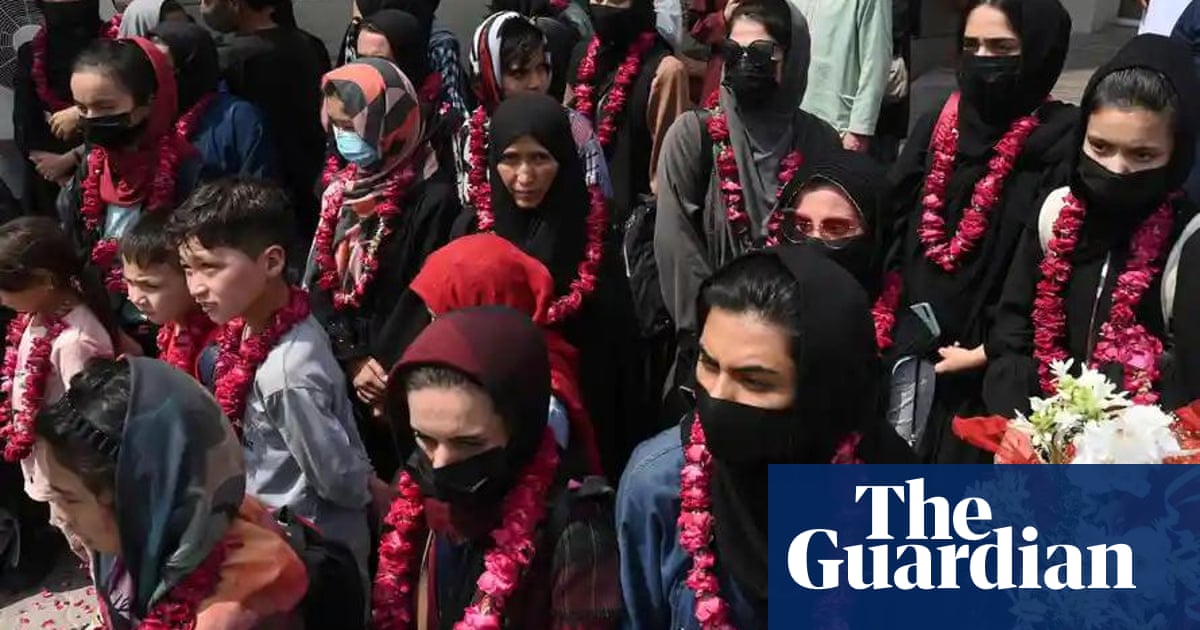‘A modern-day Schindler’s List’: Afghan junior women footballers land in UK - 4 minutes read

Shortly before 4am on Thursday morning, a private chartered plane touched down on a freezing London runway. On board were 130 exhausted, nervous but extremely relieved female footballers and their families, whose dramatic journey to the UK from Afghanistan started more than four months ago, before Kabul fell to the Taliban and triggered an exodus.
After months of hiding, political negotiations, frantic calls and WhatsApp messages, the help of a reality TV star – and the heroic efforts of one particular woman, Khalida Popal – the Afghan girls’ youth development football team finally touched down on British soil with the promise of a new future with Leeds United.
The group, which includes 35 teenage players and their relatives, had been in Pakistan on temporary visas but on Thursday they were accepted into Britain after intense wrangling.
“Afghan female football was built on activism – to use the power of our voices and the power of our sporting platform for women’s empowerment and justice beyond sport,” she said in a statement.
“This team have been through a lot and have made many sacrifices on their journey to freedom. Since August, they have been displaced from their homes and have been desperately looking forward to the freedoms and basic human rights that we often take for granted.”
The female Afghan national team were evacuated from Kabul to Australia in August after the country fell to the Taliban, while the youth football team were granted asylum in Portugal. But the youth development team, which trains girls from underprivileged backgrounds, became stranded after attempts to evacuate them to Doha failed as they were denied access to Kabul airport amid a terror threat.
Terrified, they went into hiding before crossing the border into Pakistan on temporary visas. Wrangling, diplomacy and advocacy followed, with a secret WhatsApp group of billionaire philanthropists, NGO workers, footballers, FIFA members, advisers and lawyers among others pinging at all hours of the night and day as they tried to pull strings and work all avenues to secure a safe place for the team.
Their escape from Kabul was sponsored by the ROKiT Foundation, who responded to pleas from Popal, before Leeds United’s chair, Andrea Radrizzani, and the NGO Football for Peace provided support. The Guardian understands that the flight was chartered by an UK-Jewish charity, Tzedek, with some funding provided by the reality TV star Kim Kardashian.
When the young women and their families set off to the UK they were overwhelmed by emotion and gratitude, said Siu-Anne Marie Gill, CEO of the ROKiT Foundation, with one saying their lives were in debt to those who had helped them. “They were overwhelmed and thrilled and excited,” she said.
As the plane took off, Radrizzani tweeted a picture of passengers waiting to board a plane, writing: “First chapter written today! When I received a call asking help to rescue the youth team from Afghanistan, I didn’t know even from where to start. Today they flew to UK. Proud to be part of the team to make this real. Let’s dream one day they will play in Leeds United FC.”
Gill said that helping the young women escape, with financial backing from Jonathan Kendrick, chairman and co-founder of the ROKiT Group of companies, had consumed her entirely for 12 weeks. “It was day in day out from 2 in the morning to 10 at night,” she said. “This is a modern-day Schindler’s List. We had to save everyone we could.”
Kashif Siddiqi, a London-born footballer who played for Pakistan’s international team and co-founded Football for Peace, said the last few months had been the most stressful of his life, as the NGO helped diplomatic negotiations behind the scenes.
“It is definitely the hardest thing I’ve been involved in. Trying to liaise in real time with so many governments, so many countries involved, different times zones and different personalities is difficult,” he said. “We knew their lives were at stake. But I’ve always said that football can save lives, and I think this is a perfect example that the power of football can really effect change.”
As the players entered quarantine in the UK, Radrizzani said the club was ready to support the girls and their families in an “inclusive and prosperous” future. “We can’t wait to see them playing football again,” he said.
Source: The Guardian
Powered by NewsAPI.org